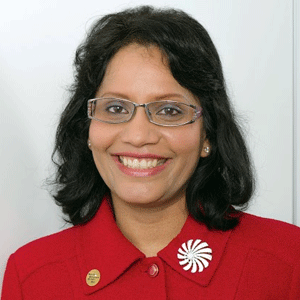THANK YOU FOR SUBSCRIBING

Investing in Digital Infrastructure for Development and Impact
Waleed Saraf, Principal Investment Officer & APAC TMT Lead at IFC


Waleed Saraf, Principal Investment Officer & APAC TMT Lead at IFC
The International Finance Corporation (IFC) is a member of the World Bank Group. We are the largest global development institution focused on the private sector in emerging markets. As part of the infrastructure team, I focus on the digital infrastructure space, leading IFC’s investments across Asia and the Pacific. Digital infrastructure investments at IFC include debt and equity investments across mobile network operators, broadband service providers, tower companies, and data centers. IFC also engages with the media sector - focusing on audiovisual content and creative digital technologies - as well as Infratech, a fast-growing industry that leverages technology to improve infrastructure efficiency. Furthermore, IFC often works ‘upstream’ to develop projects and unlock sector bottlenecks at the pre-financing stage. During the financial year ending June 30, 2022, IFC invested in excess of US$23bn from its own account and through mobilization, of which IFC’s investment in digital infrastructure amounted to US$1.3bn.
1. As the Principal Investment Officer & APAC TMT Lead, can you elaborate on what a typical day at IFC looks like for you?
A typical day could include: (i) meeting with teams to discuss ongoing projects, investment opportunities, and progress made on existing investments; (ii) discussions with potential investee companies to discuss their business model, growth plans, and financials; (iii) catching up on industry news and research reports to stay on top of emerging trends and gain insights into the latest developments in the field; (iv) meet with existing clients to discuss any challenges they are facing and brainstorm ways to support their growth.
2. Can you also elaborate on how you Identify and evaluate opportunities to increase the social development impact of new or prospective projects?
As a development finance institution, IFC focuses on digital connectivity as it is critical for promoting economic growth and development, increasing productivity and efficiency, facilitating the growth of new businesses and industries, and creating jobs. Furthermore, it can help bridge the gap between urban and rural areas by connecting remote and underserved populations with the rest of the world and ensuring better access to information; as a result, it reduces inequality and promotes social and economic inclusion.
Each sub-sector within the digital infrastructure space is unique in the ways that it can create a development impact. When evaluating investments, IFC not only looks at what impact a certain business is creating but how IFC can support the client in creating additional impact. Over the years, IFC has been increasing its focus on climate change and how we can support clients in reducing their carbon footprint. Companies in the digital infrastructure space have increasingly recognized their impact on the environment and have set goals to achieve net zero.
One way we have supported companies in measuring their impact on the environment and helping them reduce emissions is through sustainability-linked financing instruments. Green, social, sustainability, and sustainability-linked annual issuances reached over $1.6 trillion in 2021, double the volume in 2020, according to data from BloombergNEF. IFC has been a pioneer in this space, having issued its first green bond in 2010. We have since become one of the largest global issuers of green bonds (172 issued valued at around US$10 billion in 20 currencies), and we have also issued and/or invested in a range of other innovative sustainability-related financing instruments including blue, social and sustainability-linked loans and bonds.
IFC is currently in discussions with several companies across the digital infrastructure landscape to support them in tapping sustainability-linked financing instruments. For sustainability-linked financing, pricing is linked to the achievement of ambitious environmental, social, and/or governance (ESG) targets, where target compliance is verified at an agreed point in time in the future. These targets need to be relevant to the business and ambitious compared to “business as usual” and peers.
As part of the engagement, (i) IFC provides in-depth advisory to clients to develop and/or refine their sustainability strategy; (ii) can take the role of Sustainability Coordinator to assist in the preparation of Sustainable Financing Frameworks, help select targets, undertake materiality assessments, and manage the structuring of the instrument; and (iii) once potential areas of intervention are identified, IFC can support clients in their implementation.
Taking data centers as an example, metrics they can use include (i) Reduction in power usage effectiveness (PUE); (ii) Reduction in water usage effectiveness (WUE); (iii) Reduced scope 1 and scope 2 emissions; (iv) Reduced scope 3 emissions; (v) Number of female staff or women in management; (vi) Reduced accidents.
3. How does your experience in building and maintaining strong relationships with clients, global and regional private businesses, banking and multilateral partners, and government officials enhance IFC’s contribution to the larger business landscape?
IFC operates in over 100 countries, with half of the staff located in country offices close to clients, which enables us to understand the local dynamics and clients’ needs better. Also, as part of the World Bank Group, IFC has relationships with governments and regulators, which further helps us understand the overall business environment. In many instances, IFC’s clients invest in new markets, where IFC supports them in understanding the local landscape better, introducing them to local partners, and financing their cross-border investments.
4. As an ending note, what is your advice for other senior leaders and CXOs working in the digital infrastructure sector?
Assess and measure the baseline emissions of your organization and then take steps to reduce the overall carbon footprint. As part of IFC’s climate advisory offering, IFC can support organizations in strategizing on reducing greenhouse gas emissions and advise on possible pathways for decarbonization.
If you wish to contribute further information, which you think will help us enhance the company’s profile, please feel free to share the additional information with us.
Weekly Brief
I agree We use cookies on this website to enhance your user experience. By clicking any link on this page you are giving your consent for us to set cookies. More info
Read Also
Navigating Compliance Challenges in ESG AML and Digital Onboarding
A Vision for the Future: Automation, Robotics, and the Smart Factory
The Rise of Hyper Automation
Transforming Business Operations with Robotic Process Automation
Combining Automation with AI to Achieve Human-Like Interaction
Implementing RPA - 5 Ultimate Prerequisite
Incorporating the power of recognition into our vendors' sustainability journey
Elevating Guest Experience with Data





















